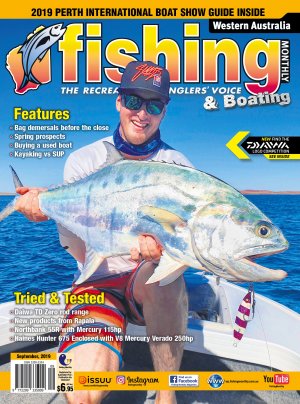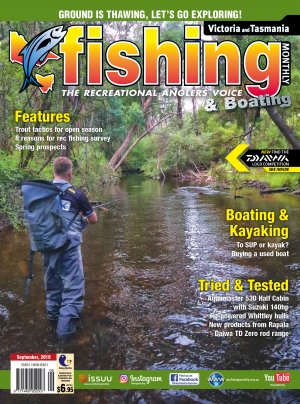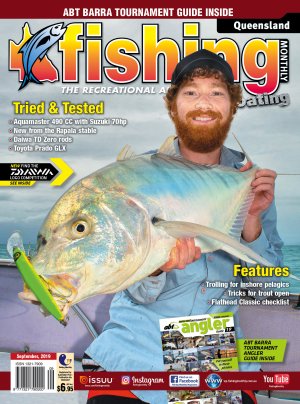I FIRST had the pleasure of meeting the original Aussie crocodile hunter 10 years ago. Malcolm Douglas had long been a bit of a cult hero of mine, and for years I had watched all of his television programs with an unwavering intensity that my university studies had lacked. Trapping rogue crocodiles for relocation and catching enormous barramundi was a much bigger drawcard than the algebraic conundrums bouncing around the back of my mind!
At the time my better half and I were travelling on one of those ‘around Australia’ trips that Malcolm Douglas has inspired in so many. When we reached Broome I contacted the man himself, and was invited to spend a day in his crocodile park. He showed us around the works and jerks of it all on a day when the park was closed to the public. We had the whole park - and Malcolm Douglas - all to ourselves! That day etched a long-lasting memory in the mind of this columnist of mere apprentice status. At that time I was scribing for various fishing rags, and in the easy company of Malcolm Douglas I thought I was King You Know What!
Since then, things have progressed nicely for the Douglas clan. Malcolm’s film-making status is legendary, and rightly so. His down-to-earth and straight-to-the-point style of commentary is exactly as the man is. He’s just the same laconic Aussie bushman who knows exactly what he’s on about. Be it crocodiles, buffalos, feral pigs or giant Kimberley barra, this bloke’s been there and done that so many times it’s all second nature to him.
Malcolm’s life began in Melbourne over 60 years ago. His earliest angling memories are of trips with his Dad throughout Victoria catching eels, redfin and trout. Hume Weir is a special place in the Douglas memory bank of fishing trips. Malcolm’s Dad worked with the United Nations and as such landed a job in the equatorial country of Nauru. This tiny island nation is more famous for its phosphates than its fishing but you would trust a young Malcolm to find far more interest in catching fish than digging up old bird poo. Indeed this was the case.
‘The visibility was over a hundred feet - straight down’ Malcolm recalls. ‘You could have a look over the side of the boat to see if there were any fish down there before dropping your bait down’. This was a unique from of bottom bashing as Malcolm and his mates would wrap a strip bait and fifty or sixty feet of line around a stone which would slowly unwind as it travelled to the bottom. A few good tugs would free the bait once it hit the bottom and it would be monstered by one of the big reef dwellers so common in those days. Sounds like a good idea doesn’t it? Environmentally friendly too!
The inevitable return to Australia saw Malcolm attend boarding school in Melbourne and then begin his short lived (but highly successful) career as a stock and station agent. The call of the wilderness however was too strong and Malcolm began exploring the country. As they say, ‘the rest is history now’. Well documented history at that! Using rather old equipment at first, Malcolm began to record his wanderings on film and thus began what is today a massively successful series of documentaries focussing on the top end of Australia. Indeed, the Kimberley with its magnificent gorges, meandering rivers, almost unbelievable waterfalls and vast sandstone escarpments is the star of just about every show!
Broome, which is often referred to as the capital of the Kimberley region, became Malcolm and his bride Valerie’s base. To this day they are well and truly entrenched in ‘Broometime’ and now have two fully functional crocodile parks. One is set almost on the beach and the other is 18km away. The parks cater for tourists, with informative lectures and close-up but safe crocodile viewing. Processing crocodile meat and skins is also part of the deal these days. The croc farm produces over 1000 skins a year, which are known worldwide as the best quality in the world. Indeed, they are a hot item and Malcolm and his staff can’t meet the demand for his skins or the massive crocodile meat trade! Crocodile meat is cholesterol-free, new age and in great demand.
Another dimension to the croc parks is the relocation of rogue animals. This is a contentious term though, because a ‘rouge’ animal really is just a croc doing croc stuff! During the midst of our chats a German tourist was taken by a croc in the Northern Territory. This tragedy will hopefully not be repeated, but if you’re tempted to have a midnight swim in crocodile territory you too may become a statistic.
Malcolm is now over 60 years old and still going strong. He’s usually up and into it by 6am and rarely returns home before 6pm. He’s still fishing, travelling, filming and adventuring regularly. When I asked him whether he intended to retire one day, his response - typical of the man - was: ‘There’ll be plenty of time to sleep when I’m dead mate!"
Malcolm’s favourite fishing pursuit is chasing barramundi on lure or fly. (What a surprise!) Hunting snapper and coral trout on fly are both right up there too. His most memorable catch was a massive barra well over 30kg that swallowed a gold Halco Laser Pro somewhere in the Berkley River at the Wyndham end of the Kimberley. He caught the fish during filming for his Big Barra doco. How appropriate is that?
I’m sure some readers would be familiar with the boat that carts Malcolm and his mates around the fabulous waterways of the Kimberley. It’s a 6.5-metre Trailcraft customised for long-range trips. Pushed along by a 150hp Optimax Mercury, the boat carries 500 litres of fuel under the floor and two full 44-gallon drums on the back. Now that’s a lot of juice!
Given the chance to fish anywhere for a week or so, Malcolm would stay in the Kimberley. And why wouldn’t he, with possibly the best fishing and crabbing on the planet? His chosen companions would be Don Burrows (who provides the original soundtrack to Malcolm’s movies), his surgeon (who recently operated on Malcolm to halt the progress of prostate cancer) and me! At last – I get an invitation!
Seriously though, prostate cancer is a very common problem and was only detected in this case by accident. Malcolm had not long ago undergone a dive medical, and the associated blood tests alerted the medicos to his condition. Malcolm urges men ‘getting on a bit’ to have the relevant checks done. It might save your life!
Malcolm’s next major production to hit the small screen is called Walkabout with Malcolm Douglas. This series is planned for release at the end of 2003 and will be screened on Channel 7 and across the globe. The format will be six short stories to be covered in each one-hour show.
I’ve had sneak preview of this series and I can tell you that it’s another winner! Make no mistake - Malcolm Douglas is an international identity well and truly. He’s exceptionally well received overseas - in fact, 50 countries run Malcolm’s shows and in Germany he’s ‘as big as a rock ‘n roll star’!
The future of Australia’s fishery is on the mind of Malcolm Douglas. While the Kimberley is not the best example of the dwindling fish stocks in Australia, he has the foresight to see plunging stocks and poor natural recruitment elsewhere. His message to the fishing public is that we need more regulations to protect what we have, and hopefully to encourage better stocks of fish in the future. The fishing public must be prepared to accept tougher regulations down the track. For Queenslanders, that looks to be happening in 2003 - changes that are way overdue.
The pro fishing scene is an issue that Malcolm sees as somewhat misdirected. He suggests that pro fishermen need to be more environmentally aware and that they need to implement nets and associated apparatus that are less likely to engage in by-catch. While Malcolm can see that the pro fishing scene is a necessary industry, he also has the foresight to suggest that those involved in pro fishing must accept more control and look to measures that will benefit their own industry in the long run.
Lastly, Malcolm Douglas has a few suggestions for Queensland-based crocodile park owners. Minimising the current trend of ‘circus acts’ would be a good start. He believes that this is sending the wrong message to those of an impressionable age and could result in tragedy. Putting staff at risk is not much more than a stunt that can backfire and, as we all know, there have been a few backfires over the years. Malcolm reckons it’s now time to concentrate more on informative tours and perhaps give the histrionics a miss!
Regular readers will have seen my interview write-ups with fishing personalities in past issues. I consider it to be a special privilege to chat to people that have an immense influence on the fishing world. Most of the people I’ve interviewed thus far can see the potential they have as far as guiding the public in the right direction goes. Thankfully, Malcolm Douglas saw this potential 40 years ago and his tactful guidance, forthright commonsense and taciturn brevity has delivered a reasonably loud and clear message. To me it says: "Look after the place and everything in it, or one day it will all be lost."
1) Malcolm with a top Charnely River barra. This was caught in 1976 during filming of Last Of The Tribe during which Malcolm spent five months in the bush.
2) Malcolm with a tasty black jew. This bloke’s as proficient on the reefs as he is on the rivers.
3. Another big barra - this time caught at the top of the Berkley River near Wyndham, WA.
4. During production of the film Coral Coast Malcolm and his dog Boondie found some pretty good cobia.
Reads: 7624



